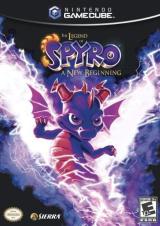As the new story goes, the world is in disarray, with the forces of evil, led by the black dragon Cynder, having conquered the good dragons who tend to the welfare of the realm. However, one dragon manages to smuggle away a single egg prophesied to give birth to a savior. After floating down a river, it instead hatches Spyro, who is taken in by a family of talking dragonflies. Upon growing up, shadows from the past encroach into his peaceful existence, and it soon becomes clear that Spyro has a grander destiny than anyone in the swamp could have imagined.
One of the game's cooler-sounding bullet points is its use of some expensive voice talent, with Elijah Wood voicing Spyro, David Spade playing his dragonfly companion, and Gary Oldman taking the part of the aged dragon Ignitus, Spyro's rescuer and mentor. Unfortunately, the script they're reading from isn't terribly good, and it turns out that even Gary Oldman is only as interesting as his material. And David Spade, as you might fear, is more annoying than humorous. Thus is falls to the gameplay to save things, and here the game has a bit more success.

Master of Dragon-fu
Whereas previous Spyro games were platforming-heavy collectathons, A New Beginning breaks with tradition and takes things in a more combat-heavy direction. A somewhat overbearing, annoying series of tutorials makes sure you're up to speed on all of his fighty new maneuvers, which include (head)butt stomps, multi-hit combos, air launchers, and even juggle attacks. Spyro also accrues a variety of elemental breath attacks. Everything is easy enough that a decent player could pick it up in 30 seconds. Or would, if not for the overlong tutorials. The controls work well, at any rate.
The levels are designed to accommodate this new focus, and it might be a bit jarring for fans of the previous games. Many worlds are not freely exploreable environments so much as linear treks between designated combat arenas. After you vanquish all the foes in an area you usually just run to the next, repeating this as the challenge slowly scales and you eventually reach a boss. There's little to no item collecting, and the platforming is strictly cursory. Flying segments bookend some levels, but they're so brief and simple as to almost not be worth mentioning.





 Average
Average


